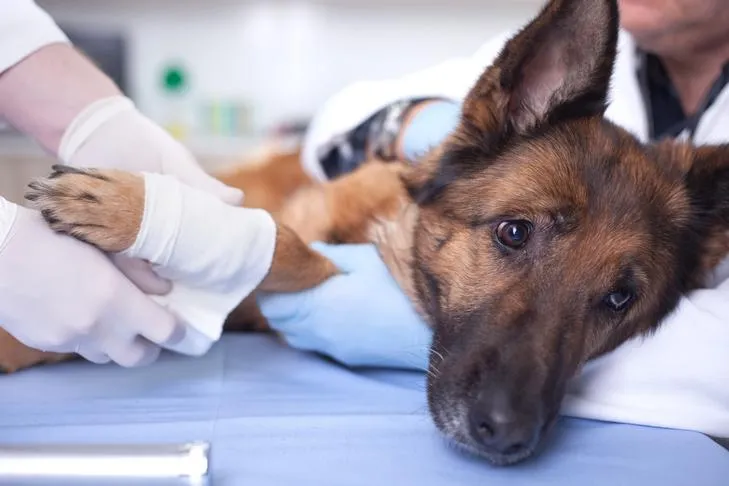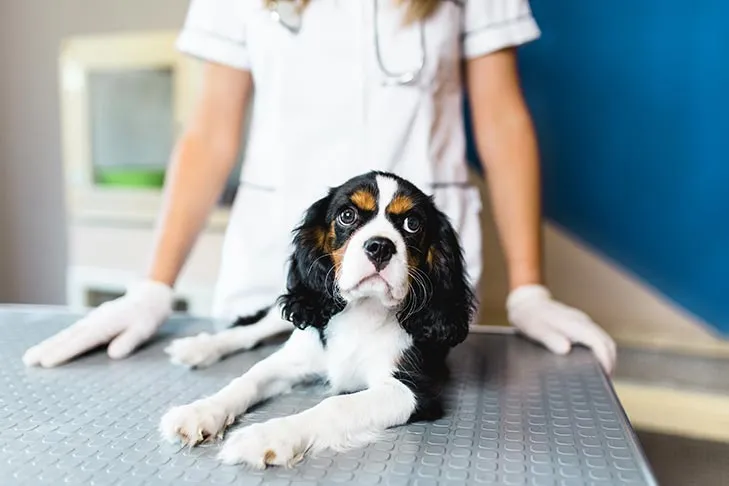When your furry friend experiences a minor scrape or cut, your first instinct might be to reach for the same first aid cream you’d use for yourself. But is it safe to apply human-grade ointments to your dog? This comprehensive guide explores the ins and outs of using First Aid Cream For Dogs, focusing on what’s safe, what’s not, and when to seek professional veterinary care. Understanding the best approach ensures your dog’s speedy and safe recovery from minor skin irritations.
Understanding First Aid Creams and Dog Wounds
Dogs, just like humans, can suffer from superficial injuries such as cuts, scrapes, and minor burns. When these incidents occur, pet owners often wonder if common over-the-counter remedies are suitable for their canine companions. The question of whether to use a human first aid cream, like Neosporin, on dogs isn’t always a simple yes or no. While some ingredients may offer benefits, others can pose risks.
What’s in Human First Aid Creams?
Many popular human first aid creams, such as Neosporin, contain a combination of antibiotics. These typically include bacitracin, neomycin, and polymyxin B. These ingredients work synergistically to combat bacteria, prevent infection, and aid in the healing of topical wounds.
- Bacitracin: Generally considered safe for topical use on animals.
- Polymyxin B: Also deemed safe for topical application on pets.
- Neomycin: This is where caution is advised. While it can be effective against bacteria, neomycin has been associated with potential adverse effects, particularly if ingested or used intravenously. Some studies have linked it to hearing loss in certain contexts. While topical application in small amounts might not always cause immediate harm, it’s a key component that warrants veterinary consultation.
When considering any topical treatment for your dog, it’s crucial to remember that these products are formulated with human physiology in mind. What is safe and effective for humans may not be for dogs, and vice-versa.
When to Consider Using First Aid Cream for Your Dog
For minor abrasions like scrapes and small scratches, the initial step in treatment involves cleaning the wound. Gently flush the area with mild soap and water, rinse thoroughly to remove any residue, and then pat the area dry. This basic hygiene helps to clear away debris and reduce the risk of infection.
However, for more serious wounds, such as puncture wounds or deep lacerations, including those from dog bites, it is imperative to seek veterinary attention as soon as possible. These types of injuries carry a higher risk of internal damage and infection.
Patch Testing for Sensitivity
Before applying any new topical product to your dog, especially if it contains antibiotics or other active ingredients, a patch test is highly recommended. Choose a small, inconspicuous area of your dog’s skin and apply a tiny dab of the cream. Monitor the area for the next 24-48 hours to check for any signs of adverse reactions, such as redness, swelling, rash, or itching. If any of these symptoms appear, discontinue use immediately and consult your veterinarian.
Dr. Danel Grimmett, a veterinarian with Sunset Veterinary Clinic in Oklahoma, suggests that in typically small amounts, human first aid creams might not be overtly harmful. However, a patch test is a proactive measure to ensure your dog doesn’t have an underlying sensitivity to the ingredients, which could lead to more significant issues if applied to a larger wound.
Precautions and Potential Risks
While the intention behind using first aid cream is to promote healing, there are several reasons why it might not be the best or safest choice for your dog, or why its use needs careful consideration.
Ingestion and Gastrointestinal Upset
One of the biggest concerns with topical ointments is that dogs may lick them off the wound. This is not only counterproductive, as it removes the medication, but it can also lead to gastrointestinal upset. If your dog ingests a significant amount of a human first aid cream, they may experience vomiting or diarrhea. This can be due to the active ingredients or the lubricant base of the ointment itself.

If your dog is prone to licking wounds, a sterile dressing or bandage might seem like a good solution. However, bandages must be applied with extreme care. An improperly applied bandage can restrict blood flow, acting like a tourniquet, and cause further harm. Many dogs also tend to chew at bandages, rendering them ineffective and potentially introducing new issues.
When First Aid Cream is Not Recommended
Using human first aid creams on dogs is generally not advisable in the following situations:
- Deep or Severe Wounds: Any wound that appears deep, is bleeding heavily, or shows signs of infection (e.g., pus, significant swelling, extreme redness) requires immediate professional veterinary care.
- Puncture Wounds: These are difficult to clean thoroughly and have a high risk of internal infection.
- Animal Bites: Wounds from animal bites can introduce bacteria deep into the tissue and should always be assessed by a veterinarian.
Safer Alternatives for Canine Wound Care
Given the potential risks associated with human first aid creams, it’s often best to opt for products specifically designed for veterinary use. These formulations are tailored to be safe for dogs, even if accidentally ingested.
Veterinary-Specific Wound Treatments
There are numerous safe and effective topical treatments available for dogs that are formulated by veterinary professionals. These products may include antiseptic solutions, antibiotic ointments, or soothing balms that are specifically tested for canine safety. They are designed to address a range of minor skin irritations and support the healing process without the risks associated with human medications.

These specialized products offer peace of mind, knowing that they are formulated with your dog’s unique physiology and potential for accidental ingestion in mind. Always look for products labeled for veterinary use or consult your veterinarian for recommendations.
The Importance of Veterinary Consultation
Ultimately, the most crucial step in treating any wound on your dog, no matter how minor it may seem, is to consult with your veterinarian. They are the most qualified professionals to assess the severity of the injury, identify any underlying issues, and recommend the most appropriate and safest course of treatment for your dog.
Dr. Rachel Barrack, a licensed veterinarian, emphasizes that while veterinarians strive to provide the best care, they are better equipped to diagnose and treat potential infections than pet owners at home. Self-treating without professional guidance can sometimes delay proper care or even exacerbate the problem.
Your veterinarian can:
- Properly clean and debride the wound.
- Prescribe appropriate topical or oral medications if necessary.
- Advise on wound management and bandaging techniques.
- Identify signs of infection that might not be obvious to an untrained eye.
- Recommend safe and effective first aid cream options specifically for dogs.
Conclusion
While the convenience of having human first aid cream readily available is understandable, it’s essential to prioritize your dog’s safety and well-being. The potential risks associated with ingredients like neomycin, and the possibility of ingestion, make human topical ointments a less-than-ideal choice for canine wound care.
Always lean towards veterinary-specific products or, better yet, consult your veterinarian before administering any medication to your dog. Their expertise ensures that your beloved companion receives the most effective and safest treatment for any minor injuries, promoting a swift and healthy recovery. For any concerns about your dog’s health, reaching out to a trusted veterinarian is always the best first step.
References
- Dr. Rachel Barrack, Animal Acupuncture: http://www.animalacupuncture.com/about-dr-barrack
- Dr. Danel Grimmett, Sunset Veterinary Clinic: http://www.sunsetvetclinic.com/edmond-veterinarians/danel-grimmett-dvm/
- AKC: Common Conditions – Dog Vomiting Causes, Diagnosis, and Treatment: https://www.akc.org/expert-advice/health/common-conditions/dog-vomiting-causes-diagnosis-and-treatment/
- AKC: Common Conditions – Doggie Diarrhea: https://www.akc.org/expert-advice/health/common-conditions/doggie-diarrhea/
- Chewy (Example of veterinary-specific products): https://chewy.sjv.io/Xmeem5
